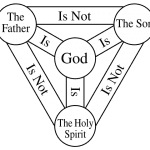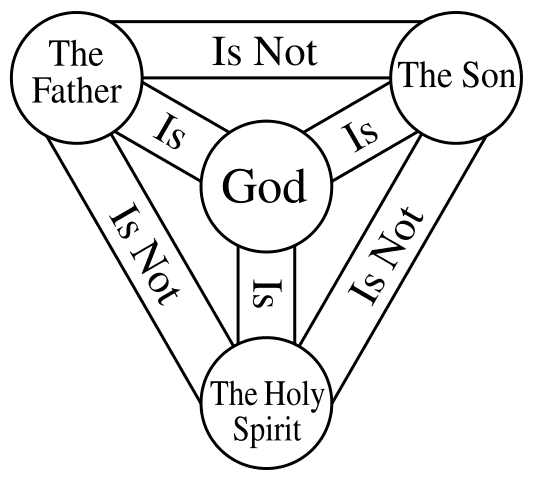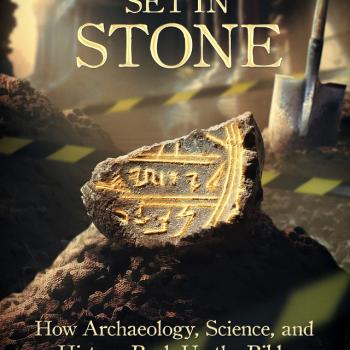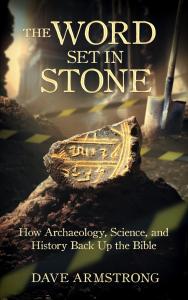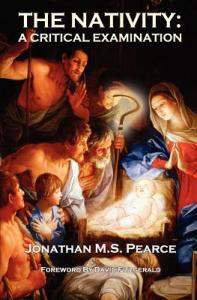
I first ran across former Christian minister and atheist John W. Loftus back in 2006. We dialogued about the problem of evil, and whether God was in time. During that period I also replied to an online version of his deconversion: which (like my arguments about God and time) he didn’t care for at all. I’ve critiqued many atheist deconversion stories, and maintain a very extensive web page about atheism. In 2007 I critiqued his “Outsider Test of Faith” series: to which he gave no response. Loftus’ biggest objection to my critique of his descent into atheism was that I responded to what he called a “brief testimony.” He wrote in December 2006 (his words in blue henceforth):
Deconversion stories are piecemeal. They cannot give a full explanation for why someone left the faith. They only give hints at why they left the faith. It requires writing a whole book about why someone left the faith to understand why they did, and few people do that. I did. If you truly want to critique my deconversion story then critique my book. . . . I challenge you to really critique the one deconversion story that has been published in a book. . . . Do you accept my challenge?
I declined at that time, mainly (but not solely) for the following stated reason:
If you send me your book in an e-file for free, I’d be more than happy to critique it. I won’t buy it, and I refuse to type long portions of it when it is possible to cut-and-paste. That is an important factor since my methodology is Socratic and point-by-point. . . . You railed against that, saying that it was a “handout.” I responded that you could have any of my (14 completed) books in e-book form for free.
Throughout August 2019, I critiqued Dr. David Madison, a prominent contributor to Loftus’ website, Debunking Christianity, no less than 35 times. As of this writing, they remain completely unanswered. I was simply providing (as a courtesy) links to my critiques underneath each article of Dr. Madison’s, till Loftus decided I couldn’t do that (after having claimed that I “hate” atheists and indeed, everyone I disagree with). I replied at length regarding his censorship on his website. Loftus’ explanation for the complete non-reply to my 35 critiques was this: “We know we can respond. It’s just that we don’t have the time to do so. Plus, it’s pretty clear our time would be better spent doing something else than wrestling in the mud with you.” He also claimed that Dr. Madison was “planning to write something about one or more of these links in the near future.” Meanwhile, I discovered that Dr. Madison wrote glowingly about Loftus on 1-23-17:
When the history of Christianity’s demise is written (it will fade eventually away, as do all religions), your name will feature prominently as one who helped bring the world to its senses. Your legacy is secure and is much appreciated.
This was underneath an article where Loftus claimed: “I’ve kicked this dead rodent of the Christian faith into a lifeless blob so many times there is nothing left of it.” I hadn’t realized that Loftus had single-handedly managed to accomplish the stupendous feat of vanquishing the Hideous Beast of Christianity (something the Roman Empire, Muslims, Communists, and many others all miserably failed to do). Loftus waxed humbly and modestly ten days later: “I cannot resist the supposition that my books are among the best. . . . Every one of my books is unique, doing what few other atheist books have done, if any of them.”
These last three cited statements put me “over the edge” and I decided to buy a used copy of his book, Why I Became an Atheist (revised version, 2012, 536 pages) and critique it, as he wanted me to do in 2006. Moreover, on 8-27-07 he made a blanket challenge about the original version of this book: “I challenge someone to try this with my book. I might learn a few things, and that’s always a goal of mine. Pick it up and deal with as many arguments in it that you can. Deal with them all if you can.” His wish is granted (I think he will at length regret it), and this will be my primary project (as a professional apologist) in the coming weeks.
Despite all his confident bluster, I fully expect him to ignore my critiques. It’s what he’s always done with me (along with endless personal insults). I’m well used to empty (direct) challenges from atheists, based on my experience with Madison and “Bible Basher” Bob Seidensticker, who also has ignored 35 of my critiques (that he requested I do). If Loftus (for a change) decides to actually defend his views, I’m here; always have been. And I won’t flee for the hills, like atheists habitually do, when faced with substantive criticism.
The words of John Loftus will be in blue.
*****
John Loftus’ chapter 5 is entitled, “Does Morality Come from God?” (pp. 103-126).
Christians claim their moral foundation is superior to others in that their faith provides the only sufficient standard for morality. Other moral systems either do not, or cannot provide one. (p. 103)
This is simply untrue. To the contrary, we believe in natural law and conscience, and believe that it is innate in all human beings, and put there by God. St. Paul appears to teach this in Romans 2, and we have no less of an apologist than C. S. Lewis stating:
I send you back to your nurse and your father, to all the poets and sages and law givers, because, in a sense, I hold that you are already there whether you recognize it or not: that there is really no ethical alternative: that those who urge us to adopt new moralities are only offering us the mutilated or expurgated text of a book which we already possess in the original manuscript. (Christian Reflections, chapter four, “On Ethics” [1943?])
(1) The human mind has no more power of inventing a new value than of planting a new sun in the sky or a new primary colour in the spectrum.
(2) Every attempt to do so consists in arbitrarily selecting one maxim of traditional morality, isolating it from the rest, and erecting in into an unum necessarium. (Christian Reflections, chapter six, “The Poison of Subjectivism” [1943])
I noted in installment #4 of this series how Lewis compiled a list of common ethical precepts in different moral / religious systems:
All religions and indeed ethical systems (whether religious or not) have great commonalities. This was a central thesis of C. S. Lewis’s book The Abolition of Man. Anyone can word-search the free online version for “Appendix Illustrations of the Tao” to find many examples of commonalities in ethics. For example, Lewis found the Golden Rule in the Analects of Confucius: “Never do to others what you would not like them to do to you.”
It’s been argued that Confucianism is not even (technically) a religion, and that it is either a form of atheism, or that — for all practical purposes — an atheist could at least consistently practice it. The Wikipedia article “Confucianism” explains:
Tiān (天), a key concept in Chinese thought, refers to the God of Heaven, the northern culmen of the skies and its spinning stars, earthly nature and its laws which come from Heaven, to “Heaven and Earth” (that is, “all things”), and to the awe-inspiring forces beyond human control. . . .
The scholar Ronnie Littlejohn warns that Tian was not to be interpreted as personal God comparable to that of the Abrahamic faiths, in the sense of an otherworldly or transcendent creator. Rather it is similar to what Taoists meant by Dao: “the way things are” or “the regularities of the world”, which Stephan Feuchtwang equates with the ancient Greek concept of physis, “nature” as the generation and regenerations of things and of the moral order.
Lewis is very widely considered the greatest Christian apologist in the second third of the 20th century. G. K. Chesterton (most would agree) filled that role in the first third. And he concurs with Lewis:
It seems to me that the mass of men do agree on the mass of morality, but differ disastrously about the proportions of it. The difference between men is not in what merits they confess, but what merits they emphasise. Men do not differ much about what things they will call evils; they differ enormously about what evils they will call excusable. (Illustrated London News, “The Proper Emphasis in Morality,” 10-23-09)
Christianity satisfied the previous cravings of mankind. (Illustrated London News, “The Neglect of Christmas,” 1-13-06)
Nobody ever disputed that humanity was human before it was Christian; . . . One of the chief claims of Christian civilisation is to have preserved things of pagan origin. (The Superstition of Divorce, 1920, chapter six)
Now, if the great Chesterton and Lewis and even (I contend) St. Paul all agree with this natural law which is universal and innate in all human beings, and enshrined in the conscience, I think we can safely say that Loftus has grossly misunderstood, if not misrepresented, this aspect of Christian belief as regards morality.
Loftus’ caricature above might apply to the fundamentalist Christianity that he (and so many other atheists) came out of, but not to the vast mainstream of thinking man’s Christianity. He would do well to better comprehend the latter, or else he should change this book’s subtitle to “. . . Rejects Fundamentalism” rather than “. . . Rejects Christianity.”
I agree (over against divine command theory) with Christian philosopher J. P. Moreland, cited in the book (p. 105): “Morality is ultimately grounded in the nature of God, not independently of God.”
In a quick potshot against the Bible’s moral injunctions, Loftus notes, “the man would be the domineering patriarchal head of the house in which a wife is to ‘obey’ her husband just like Sarah obeyed Abraham (1 Pet. 3:6).” Of course, Loftus conveniently omits the next verse: “Likewise you husbands, live considerately with your wives, bestowing honor on the woman as the weaker sex, since you are joint heirs of the grace of life, in order that your prayers may not be hindered” (RSV). Dr. Scott Hahn in the Ignatius Catholic Study Bible, comments:
Genesis gives no indication that Abraham, for his part, lacked respect for Sarah or considered her a mere slave under his authority. . . . the weaker sex: The statement is made in reference to a woman’s physical constitution, not her moral character or intellectual ability. Because a man’s natural strength exceeds that of a woman, the husband is called to honor his bride, lest he misuse his physical advantage to intimidate or abuse her.
And as to “submission” we should also briefly consider the “classic” passage: Ephesians 5:21-29. Paul makes a general statement to all Christians: “Be subject to one another out of reverence for Christ” (5:21). Then after saying “Wives, be subject to your husbands” (5:22): the passage so despised by radical feminists and atheists alike, we see what he commanded the husbands to do: “Husbands, love your wives, as Christ loved the church and gave himself up for her,” (5:25).
This is a far more difficult command. The husband has to love the wife like Christ loved, which is the royal commandment: “love one another as I have loved you” (Jn 15:12). And how does Jesus love His disciples? He washed their feet (Jn 13:5). Then He explained to them:
John 13:13-17 You call me Teacher and Lord; and you are right, for so I am. [14] If I then, your Lord and Teacher, have washed your feet, you also ought to wash one another’s feet. [15] For I have given you an example, that you also should do as I have done to you. [16] Truly, truly, I say to you, a servant is not greater than his master; nor is he who is sent greater than he who sent him. [17] If you know these things, blessed are you if you do them.
This is the furthest imaginable thing from a husband “lording it over his wife” or abusing her as an inferior. Jesus elaborated on this same theme:
Matthew 20:25-26 . . . “You know that the rulers of the Gentiles lord it over them, and their great men exercise authority over them. [26] It shall not be so among you; but whoever would be great among you must be your servant,”
This is true Christianity: not the caricatures of the skeptic and the atheist polemicist. Loftus took his shot by citing one passage out of its overall context of biblical teaching on marriage (which I provided in a nutshell form). He knew he could get “mileage” out of it. All he sees is legalistic bondage and oppression. The true teaching, on the other hand, is a beautiful partnership (not an ugly thing), with the husband (of the two partners) having the greater responsibility to serve his wife.
Now, do Christians husbands habitually fall short? Of course; this is the human condition (it’s why we continually need grace, the Holy Spirit, the sacraments, and a Savior). But Loftus attacked the biblical teaching on marriage, and I have shown how it was unwarranted.
Loftus soon moves onto a long laundry list of alleged characteristics of God (especially as revealed in the Old Testament), claiming that Yahweh, the God of the Bible, is a “moral monster” (section title on p. 108). It’s a full-fledged attack upon God Himself: arguing that He is evil and wicked (like Satan).
Since this sort of thing is often the “passionate heart” of much anti-theist atheist polemics (what they feel is one of their “silver bullets”), and because the portrayals are so unjust and outright twisting of biblical teachings, I would like to spend considerable time on it. Fortunately, I have already dealt in depth with many of these “anti-God” claims in other papers, and so can simply link to them, where applicable.
[T]he biblical God, Yahweh, is a hateful, racist, and sexist God . . . (p. 108)
He customarily punishes people, even babies, for the sins of others beginning in the garden of Eden (Gen. 3:16-18) . . . (p. 108)
This gets into original sin, which is a long discussion, but suffice it to say that Christianity believes that the fall of man was a corporate one:
1 Corinthians 15:22 For as in Adam all die, so also in Christ shall all be made alive.
We all rebelled through Adam’s disobedience (Adam represented mankind), and we all can be saved (sufficient grace is available) through Christ our savior. So in that sense it is not judging one person for the sin of someone else. When it comes to the actual sin that each person commits, Scripture makes it clear that we’re all accountable for our own sin and no one else’s:
Deuteronomy 24:16 The fathers shall not be put to death for the children, nor shall the children be put to death for the fathers; every man shall be put to death for his own sin. (cf. 2 Ki 14:6; 2 Chr 25:4)
Jeremiah 31:30 But every one shall die for his own sin . . .
Ezekiel 18:19-20 “Yet you say, `Why should not the son suffer for the iniquity of the father?’ When the son has done what is lawful and right, and has been careful to observe all my statutes, he shall surely live. [20] The soul that sins shall die. The son shall not suffer for the iniquity of the father, nor the father suffer for the iniquity of the son; the righteousness of the righteous shall be upon himself, and the wickedness of the wicked shall be upon himself.
[H]e punishes . . . the children, grandchildren, great grandchildren and great-great grandchildren of the parents who worship other gods (Exodus 20:3-5) . . . (p. 108)
I have dealt with this very passage in depth.
He even makes the parents of Jerusalem cannibalize their own children . . . (Jeremiah 19:9) (p. 108)
Jeremiah 19:9 And I will make them eat the flesh of their sons and their daughters, and every one shall eat the flesh of his neighbor in the siege and in the distress, with which their enemies and those who seek their life afflict them.
Bible scholar E. W. Bullinger explains this in his 1104-page tome, Figures of Speech Used in the Bible (London: 1898). It’s also available for free, online. He explains the linguistic factors that explain this odd verse (pp. 823-824):
4. Active verbs were used by the Hebrews to express, not the doing of the thing, but the permission of the thing which the agent is said to do. Thus: . . .
Ex. iv. 21. — ” I will harden his heart (i.e., I will permit or suffer his heart to be hardened), that he shall not let the people go.” So in all the passages which speak of the hardening of Pharaoh’s heart. . . .
[I have written about this at some length, showing how all the passages taken together indication God’s permission, not causation]
[ . . . ]
So the A.V. Jer. iv. 10. — ” Lord God, surely thou hast greatly deceived this people ” : i.e., thou hast suffered this People to be greatly deceived, by the false prophets, saying : Ye shall have peace, etc.
Ezek. xiv. 9. — ” If the prophet be deceived when he hath spoken a thing, I the Lord have deceived that prophet “: i.e., I have permitted him to deceive himself.
[the previous chapter 13 describes the “foolish prophets” (13:3) who “prophesy out of their own minds” (13:2), who have “spoken falsehood and divined a lie; they say, ‘Says the LORD,’ when the LORD has not sent them” (13:6). God is “against” (13:8-9) “the prophets who see delusive visions and who give lying divinations” (13:9). Clearly God utterly opposes them, and 14:9 is non-literal metaphor for God allowing them to prophesy falsely]
Ezek. XX. 25. — ” Wherefore I gave them also statutes that were not good ” : i.e., I permitted them to follow the wicked statutes of the surrounding nations, mentioned and forbidden in Lev. xviii. 3.
Jeremiah 19:9 utilizes the same figure of speech. In similar cross-references (Dt 28:53-57; Lev 26:29; 2 Ki 6:26-29; Ezek 5:10; Lam 4:10), it’s clear that God is not in favor of cannibalism, but rather, is describing free will sinful actions of the Israelites. Jeremiah 19:9 has the same meaning, but contains the figure of speech, so it can be misinterpreted, as Loftus and other atheists have done for their purposes: not understanding this aspect of Hebrew literary genre.
Many other passages that Loftus cites in order to indict God have to do with judgment, including the death penalty in many cases regarding Jewish Law: which God as the prerogative to do. This is perfectly plausible and understandable, by the analogy of human laws and judges who enforce those laws. I’ve written about this many times:
God’s Judgment of Humans (Sometimes, Entire Nations) [2-16-07]
“How Can God Order the Massacre of Innocents?” (Amalekites, etc.) [11-10-07]
Did Moses (and God) Sin In Judging the Midianites (Numbers 31)? [5-21-08]
Israel as God’s Agent of Judgment [9-28-14]
Is God an Unjust Judge? Dialogue with an Atheist [10-30-17]
God’s Judgment of Sin: Analogies for an Atheist Inquirer [9-6-18]
Madison vs. Jesus #9: Clueless Re Rebellion & Judgment [8-7-19]
Loftus argues that hell is unjust and indefensible (pp. 108-109). I’ve written about that many times, too:
Dialogue w Agnostic on Basic Differences and Hell [5-17-05]
Replies to Some Skeptical Objections to the Christian Doctrine of Hell (“Religion Is Lies” website) [5-24-06]
Dialogue w Atheists on Hell & Whether God is Just [12-5-06]
Hell: Dialogue with a Philosophy Graduate Student [12-26-08]
Dialogue: Hell & God’s Justice, Part II [1-2-09]
Can Hell Actually be Defended? My Shot … [10-7-15]
A Defense of Hell: Philosophical Explanations of its Plausibility, Necessity, and Factuality [12-10-15]
Exchanges with an Atheist on Hell & Skepticism [12-17-15]
Hell as a Deterrent: Analogy to Our Legal Systems [10-3-18]
Loftus (p. 109) goes after references to slavery in the Bible. I’ve dealt with that, also:
Micah exactly represents the people’s feeling; they would do anything but what God required; they would make the costliest sacrifice, even, in their exaggerated devotion, holding themselves ready to make a forbidden offering; but they would not attend to the moral requirements of the Law. It is probably by a mere hyperbole that the question in the text is asked. The practice of human sacrifice was founded on the notion that man ought to offer to God his dearest and costliest, and that the acceptability of an offering was proportioned to its preciousness. The Hebrews had learned the custom from their neighbours, e.g. the Phoenicians and Moabites (comp. 2 Kings 3:27), and had for centuries offered their children to Moloch, in defiance of the stern prohibitions of Moses and their prophets (Leviticus 18:21; 2 Kings 16:3; Isaiah 57:5). They might have learned, from many facts and inferences, that man’s self-surrender was not to be realized by this ritual; the sanctity of human life (Genesis 9:6), the substitution of the ram for Isaac (Genesis 22:13), the redemption of the firstborn (Exodus 13:13), all made for this truth. But the heathen idea retained its hold among them, so that the inquiry above is in strict keeping with the circumstances.
We even read where the King of Moab sacrificed his son, which caused the Israelites to retreat in defeat. Moab’s sacrifice created a great “wrath” (ketzef) . . . indicating that his sacrifice caused some divinity to act on behalf of Moab (2 Kings 3:26-27). (p. 111)
I dealt with this very passage when fellow Bible-bashing atheist Bob Seidensticker tried to eisegete it:
There is nothing whatsoever in the text about some supposed defeat of God (Yahweh) by a false Moabite god. . . . Nor is it proof that God turned against Israel / Judah simply because the word “wrath” (RSV) is present (KJV: “indignation”). Bob assumes that too. The Hebrew is qetseph, which is usually used of God’s wrath, but not always, and not necessarily. For example, Esther 1:18 (RSV): “This very day the ladies of Persia and Media who have heard of the queen’s behavior will be telling it to all the king’s princes, and there will be contempt and wrath in plenty” (cf. Ecclesiastes 5:17). It can also be plausibly interpreted as the wrath of the king of Moab against Israel. The Bible refers (RSV) to “a king’s wrath” twice (Proverbs 16:14; 19:12).
The translation of 2 Kings 3:27 that Bob uses is the NET Bible: a relatively obscure translation. It’s very unusual (perhaps even singular) in that it inserts “divine” into the passage, making it definitively a case of God’s wrath against Israel. But I can’t find any other translation that does this. No one need merely take my word on this. They can consult the online pages with multiple translations of the passage (one / two) just as I did.
God’s prohibition of child sacrifice as an outrageous abomination is very clear. I found 18 passages concerning this in my paper, The Bible’s Teaching on Abortion. Jesus compared the ancient sacrifice of children to hell itself (particularly, child sacrifice to Ba’al or Molech).
Seidensticker ignored this counter-argument, as he has 34 more of my papers that respond to his arguments. Loftus gets in a dig against Jesus, implying that He was a bigot, and he employs an old atheist chestnut (these things are simply recycled over and over) that distorts a Bible passage, as usual:
[H]e also called a Syrophoenician woman part of a race of “dogs” and only begrudgingly helped her (Mark 7:24-30). (p. 123)
Mark 7:25-30 But immediately a woman, whose little daughter was possessed by an unclean spirit, heard of him, and came and fell down at his feet. [26] Now the woman was a Greek, a Syrophoeni’cian by birth. And she begged him to cast the demon out of her daughter. [27] And he said to her, “Let the children first be fed, for it is not right to take the children’s bread and throw it to the dogs.” [28] But she answered him, “Yes, Lord; yet even the dogs under the table eat the children’s crumbs.” [29] And he said to her, “For this saying you may go your way; the demon has left your daughter.” [30] And she went home, and found the child lying in bed, and the demon gone.
Apologists Eric Lyons and Kyle Butt thoroughly dispense of this “objection” (complete with a good dose of sorely needed humor) in their article, “Was Jesus Unkind to the Syrophoenician Woman?”:
To our 21st-century ears, the idea that Jesus would refer to the Gentiles as “little dogs” has the potential to sound belittling and unkind. When we consider how we often use animal terms in illustrative or idiomatic ways, however, Jesus’ comments are much more benign. For instance, suppose a particular lawyer exhibits unyielding tenacity. We might say he is a “bulldog” when he deals with the evidence. Or we might say that a person is “as cute as a puppy” or has “puppy-dog eyes.” If someone has a lucky day, we might say something like “every dog has its day.” Or if an adult refuses to learn to use new technology, we might say that “you can’t teach an old dog new tricks.” In addition, one might say that a person “works like a dog,” is the “top dog” at the office, or is “dog tired.” Obviously, to call someone “top dog” would convey no derogatory connotation.
For Jesus’ statement to be construed as unkind or wrong in some way, a person would be forced to prove that the illustration or idiom He used to refer to the Gentiles as “little dogs” must be taken in a derogatory fashion. Such cannot be proved. In fact, the term Jesus used for “little dogs” could easily be taken in an illustrative way without any type of unkind insinuation. In his commentary on Mark, renowned commentator R.C.H. Lenski translated the Greek term used by Jesus (kunaria) as “little pet dogs.” . . . Lenski goes on to write concerning Jesus’ statement: “All that Jesus does is to ask the disciples and the woman to accept the divine plan that Jesus must work out his mission among the Jews…. Any share of Gentile individuals in any of these blessings can only be incidental during Jesus’ ministry in Israel” . . .
Consider that Matthew had earlier recorded how a Roman centurion approached Jesus on behalf of his paralyzed servant. Jesus did not respond in that instance as He did with the Syrophoenician woman. He simply stated: “I will come and heal him” (8:7). After witnessing the centurion’s refreshing humility and great faith (pleading for Christ to “only speak a word” and his servant would be healed—vss. 8-9), Jesus responded: “I have not found such great faith, not even in Israel” (vs. 10, emp. added). . . .
[see my related paper, David Madison vs. the Gospel of Mark #7: Ch. 7 (Gentiles) ]
What many people miss in this story is what is so evident in other parts of Scripture: Jesus was testing this Canaanite woman, while at the same time teaching His disciples how the tenderhearted respond to possibly offensive truths. . . .
Before people “dog” Jesus for the way He used an animal illustration, they might need to reconsider that “their bark is much worse than their bite” when it comes to insinuating that Jesus was unkind and intolerant. In truth, they are simply “barking up the wrong tree” by attempting to call Jesus’ character into question. They need to “call off the dogs” on this one and “let sleeping dogs lie.”
***
Photo credit: John Loftus at SASHAcon 2016 at the University of Missouri; Mark Schierbecker (3-19-16) [Wikimedia Commons / Creative Commons Attribution-Share Alike 4.0 International license]
***





